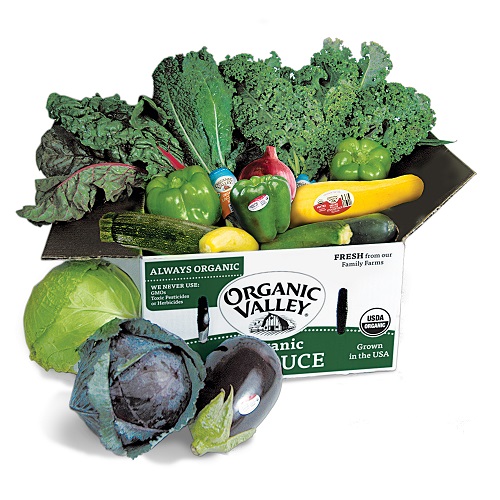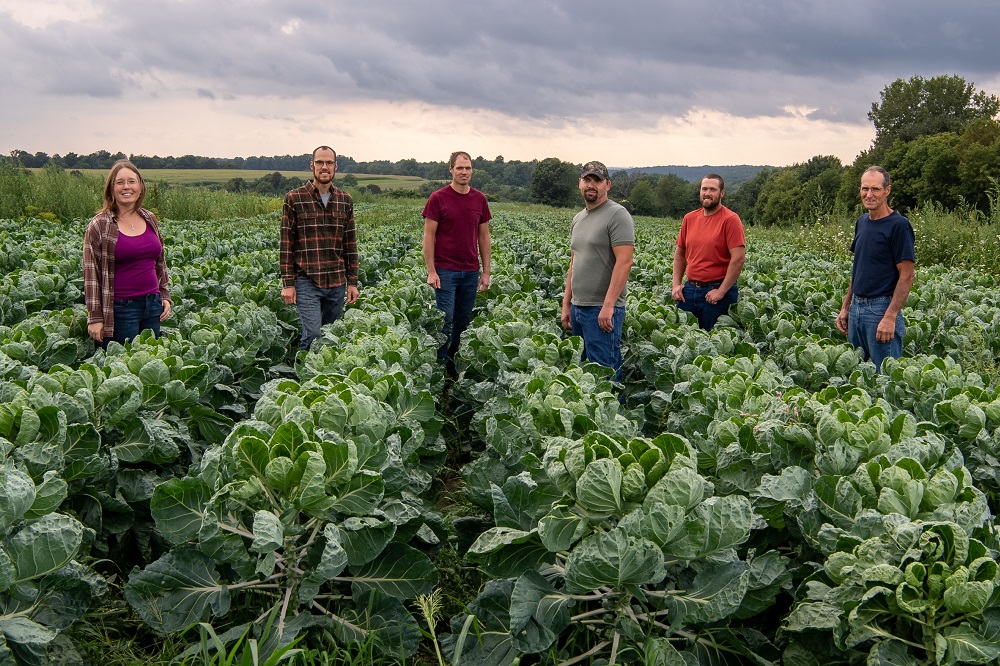Annake Ramsey is the produce program manager at Organic Valley, the largest farmer-owned organic cooperative in the US. While Organic Valley is most well-known as an organic dairy brand, the company actually started as a produce cooperative. With 69 farmers from 9 states, Organic Valley’s produce program sells 40 varieties of vegetables with an annual volume of over 3 million pounds. Annake joined OPN for a conversation about Organic Valley’s roots in produce, her role as produce program manager, the benefits of a cooperative model for farmers, and more.

Annake Ramsey, produce program manager, Organic Valley
Can you give us a brief overview and background of the Organic Valley produce pool?
In 1988, Organic Valley began as a produce cooperative—it was a group of produce farmers that got together initially. Organic Valley’s original CEO, George Siemon, was a produce farmer, and he was also one of the founding farmers of the cooperative. Of all the states in the Midwest, Wisconsin has the most certified organic produce farms. Certainly the scale of the farms and what they look like is very different than it is on the West Coast, but we do have quite a few certified organic vegetable farms here.
That said, dairy farming is a large part of the Wisconsin economy, so when dairy farmers joined the co-op shortly after it formed and started a dairy program, that’s when the co-op really took off. But we’ve always maintained a small produce program. While dairy currently accounts for about 80 percent of Organic Valley’s revenues, produce has always been a part of what we do.
What do you do in your role as produce program manager?
I work on the farmer side of the business. In my role, I oversee the field staff that works directly with our 69 farmer-members. I’m in charge of farmer recruitment, production management, payables, and our food safety program.
Did you come from a background in produce?
I did. My first job at Organic Valley was in the marketing department, but before that I was a farmer-member of Organic Valley. I ran a CSA farm in Viroqua, Wisconsin, and we sold at farmers markets, and we sold wholesale product through the co-op. We actually have quite a few employees who either grew up on an Organic Valley farm or were also members of the co-op.

What are the benefits for farmers of being part of a cooperative?
Probably the most important benefit is that Organic Valley handles all the sales and marketing of the farmers’ product. We develop the marketing materials like the packaging, and the farmers’ paycheck is very regular. Every two weeks the farmer is paid for what they deliver to the co-op. We actually get a lot of comments about that—how important it is that they’re not waiting for their customer to pay, which we hear in the industry can sometimes be quite a long time.
We also do a fair amount of farmer education. If we have a farmer that comes to us that doesn’t already have an on-farm safety plan created, we have an extensive program that helps them create that plan so that they can meet market requirements. We also do quite a bit of training on production and quality standards. Our field staff works with our farmers, and we have our own plant pathologist that can help identify disease and pest issues in the field. We also have a soil testing program, which the farmers in our produce pool use quite extensively. We offer our farmers as many resources as possible.
Also, because they’re member-owners, the farmers vote and take part in co-op governance. Our elected board of directors are farmers. And within each pool (produce, dairy, meat, egg, and feed), there’s an election for the farmers that sit on executive committees. There’s an opportunity for farmers to have a real voice in their business. I think that that holds a lot of appeal. Our farmers have the confidence that employees are working to truly benefit their business and with their best interest in mind.
Organic Valley's 665-pound winter squash display bin
What types of produce do your farmers grow?
Winter squash is a big part of our program. We have quite a number of winter squash varieties that we sell in cases. In our 665-pound winter squash retail display bin, we typically do four main varieties of butternut, acorn, spaghetti, and then just a smattering of pie pumpkin for color. We also sell cases of delicata, kabocha, red kuri, and buttercup. We also sell fall root vegetables, brussels sprouts, and cabbage. We do a lot of greens, cucumbers, peppers, and summer squash in the summer.
Who do you sell to primarily?
We have a variety of customers. We sell to retailers, distributors, food-service companies, and ingredient customers. It runs the gamut.
Can you tell us about a couple of your produce farmers?
A lot of the farmers that we work with here in Southwestern Wisconsin are from the Plain Community, so they’re Amish or Mennonite. They moved to Wisconsin from other areas of the country with the intent of forming a community that was agrarian based, where families stay on farm and don’t leave to work in factories or other off-farm work. Around the time that the Plain Community was forming in the late eighties was when Organic Valley was forming as well, and I think there was a real synergy of goals there. The market for organic produce produced by the then-members of Organic Valley really meshed well with the values of the Amish and Mennonite community. The newly transplanted Plain Community members were some of the earliest members of the produce pool, and as their community grew, so did the market for organic produce. It’s been exciting to be able to grow together with them.
We also have members who aren’t from the Plain Community. For example, our main brussels sprouts farmers are the Langmeiers from Prairie du Chien, Wisconsin. They’re actually featured on our retail pack of brussels sprouts. And they are members of our grass-fed dairy pool as well. The parents milked cows, and the next generation became interested in vegetable farming. They grow beautiful brussels sprouts, and we’re really proud of what they produce.

The Langmeiers
What are your future plans for Organic Valley’s produce program?
We’re not in year-round production in Wisconsin, where most of our farmers are located, so we are doing more outreach in other parts of the country in order to create a year-round program. We have farmer-members in Florida. We have a potato program out of Colorado, and we continue to expand our production by working with farmers in other states. Our goal is to get as close as possible to year-round production on our core commodities from some part of the country.
Organic Valley is a mission-driven organization, supporting small family farms, a story we tell via our television advertising, print ads, digital marketing, and packaging. And it’s definitely something that consumers are interested in; the produce industry has the research showing shoppers care about environmental sustainability and social good as well as eating healthy, delicious food. They care that Organic Valley’s facilities are powered by 100-percent renewable energy, and our sustainability program helps our farmers set up renewable energy on-farm as well. They care about where their food is grown and who’s growing it, that our cooperative is owned by our farmers. They care about those stories. And so that’s something that we’re very focused on—helping to tell that story and create viable opportunities for family farms to be at the table and market their product.






